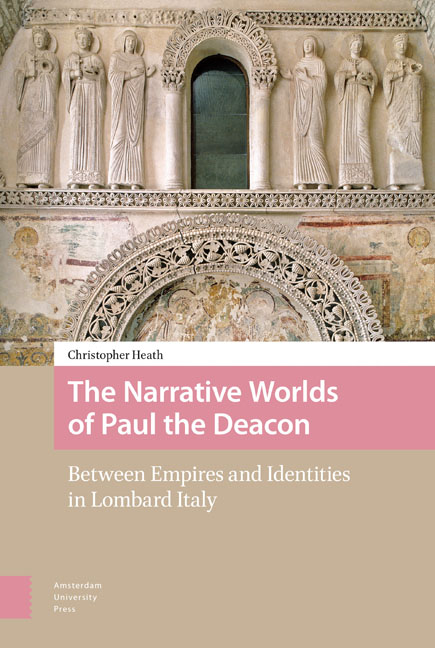Book contents
- Frontmatter
- Dedication
- Contents
- List of Tables and Diagrams
- Acknowledgements
- List of Abbreviations
- Introduction
- 1 Vir valde Peritus: Paul the Deacon and his Contexts
- 2 The Early Narratives
- 3 The Historia Langobardorum: The Structure of Paul’s World
- 4 The Historia Langobardorum: The Six Books in Detail
- 5 Conclusion
- Bibliography
- Index
3 - The Historia Langobardorum: The Structure of Paul’s World
Published online by Cambridge University Press: 10 December 2020
- Frontmatter
- Dedication
- Contents
- List of Tables and Diagrams
- Acknowledgements
- List of Abbreviations
- Introduction
- 1 Vir valde Peritus: Paul the Deacon and his Contexts
- 2 The Early Narratives
- 3 The Historia Langobardorum: The Structure of Paul’s World
- 4 The Historia Langobardorum: The Six Books in Detail
- 5 Conclusion
- Bibliography
- Index
Summary
The Historia Langobardorum is the final work of Paul the Deacon. Unlike his shorter prose works, the HR, the VSGM, and the GEM considered above, the work as it has come down to us would appear to have had no explicit patron and thus it remains without a dedicatory preface or conclusion. This has inspired considerable debate which has sought to ‘prove’ an agenda for the work and thus a patron. In this fashion, to highlight just two approaches, it has been presented at the same time as a work written for Lombard consumption and as one designed for a Frankish audience. This debate has run its course. It has not provided, and indeed cannot provide, a definitive answer. Without a proven and explicit patron, the work stands to exemplify per se both Paul's own perceptions and his interests better than his previous works more firmly anchored to a patron/client relationship. Thus, it would seem that Paul writes without apparent constraints and on matters that he wants to explore and discuss. This chapter will seek, with this in mind, to demonstrate how the Historia Langobardorum reveals not only the originality of Paul as a writer, but also his responses to the structure of his own world. In order to provide an effective contextual platform, the chapter will briefly re-visit the known links between Paul and his work. Thereafter, a discussion of both the transmission and textual history will inform a better appreciation of the security of the text used by scholars today. Subsequently, a presentation of the structural parameters will provide the broad features of the work before we conclude with a discussion of Paul's use of sources and a detailed analysis of each of the six books.
In many respects the HL marks the pinnacle of Paul's writing career, since the Historia Langobardorum was composed during the final decade of his life. He was, as we shall see, free to develop and discuss subjects that interested him both as an author and as an individual. His field of experience allowed him to develop a measure of empathy towards those outside his own ‘people’, the Lombards. Paul's connections to his own home province of Friuli and to the Lombard and Carolingian courts broadened and deepened his field of experience.
- Type
- Chapter
- Information
- The Narrative Worlds of Paul the DeaconBetween Empires and Identities in Lombard Italy, pp. 109 - 130Publisher: Amsterdam University PressPrint publication year: 2017



